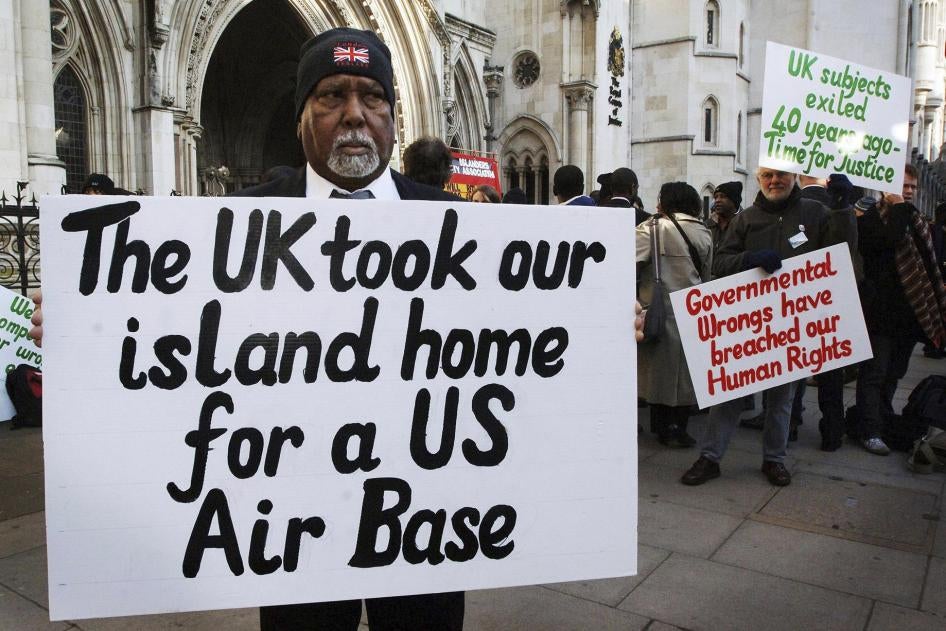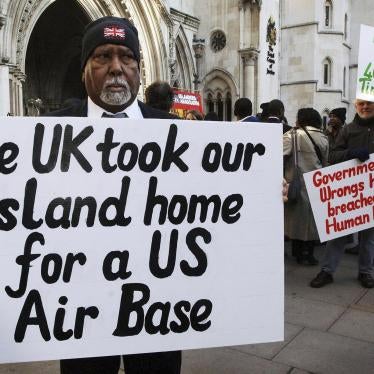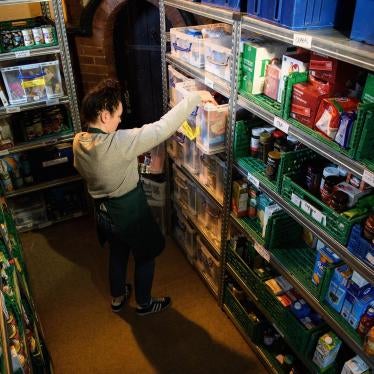The Rt Hon David Lammy MP
Secretary of State for Foreign, Commonwealth and Development Affairs
Abercrombie House, Eaglesham Road
East Kilbride G75 8EA
Via email
July 11, 2024
Dear Foreign Secretary,
Re: Labour’s Commitment to Addressing Historical and Ongoing Injustices Should Start with the Chagossians’ Right to Return
Congratulations on your appointment as Foreign Secretary. We welcome your commitment to being a champion of the international rule of law, and your longstanding commitment to fighting for racial justice. The new Labour Government comes into office with an unprecedented opportunity to right a colonial wrong and end the ongoing crime against humanity against the Chagossian people. It should choose, in the context of the ongoing negotiations with Mauritius over the future of the Chagos Islands, to announce in its first weeks in office that the UK Government will:
- Respect the Chagossians’ rights to return to their home, including Diego Garcia, and their right to other reparations
- Recognise them as an Indigenous people
- Ensure they are meaningfully consulted over their future, including in the context of the ongoing negotiations with Mauritius
- Ensure all human rights and international criminal laws apply in the territory, as they do in other UK overseas territories such as Gibraltar and the Falkland Islands.
This should mark the beginning of the new Government’s leadership on racial and colonial justice and serve as an important message to former UK colonies and the Global South more generally, that the UK will be approaching its past and present with a clear sense of responsibility and humility.
There is an urgent need to address the rights of the Chagossians now, given current negotiations with Mauritius over the future of the islands, which the new UK Government needs to address immediately, with elections due in the US and Mauritius at the end of the year. What needs to happen to end the ongoing crime is straightforward and well-known – it is simply a question of political will.
By addressing and rectifying this ongoing colonial crime, Labour would show the world that it can and will address this ongoing colonial legacy by ensuring fair reparations, including recognising the right of return, for Chagossians who have and continue to suffer crimes against humanity at the hands of the UK Government. It would also show that it is true to its word, given you stated last year that a Labour Government will “redress the historical injustice done to the Chagossians” and Labour’s manifesto also pledging to address historical injustices.
If it does not act, the new Labour Government, ministers and officials risk becoming responsible for the ongoing crime against humanity of preventing the Chagossians from returning to live in their homeland.
History
The story of the Chagossian people and their struggle for over 50 years is set out in Human Rights Watch’s 2023 report, ‘That’s When the Nightmare Started’: UK and US Forced Displacement of the Chagossians and Ongoing Colonial Crimes. Successive UK Governments colluded with US Governments to forcibly expel the entire Indigenous population from their homeland to build the military base on part of Diego Garcia island. UK official documents, now public, reveal the lies and racism that laid the foundation of this crime, with UK ministers and officials denying that the Chagossians existed. The displaced Chagossians lived in extreme poverty, mostly in Mauritius and Seychelles, and for the last 20 years, in the UK.
After losing a court case in 2000, Labour Foreign Secretary Robin Cook announced that he accepted the Chagossians’ right to return to most of their islands and expressed ‘regret’ for their treatment. However, in 2004, using an Order in Council issued by Queen Elizabeth, the Government reimposed the ban on Chagossians returning.
Following the advisory opinion of the International Court of Justice and isolation of the UK in the UN General Assembly, the Conservative Government announced the opening of negotiations over the future of Chagos with Mauritius in 2022. However, the Chagossians have not been meaningfully consulted despite the negotiations being about their homeland; they describe participating in a handful of brief Zoom calls with UK officials. Neither have the negotiations appeared to address the rights of the Chagossians, in particular their right, as the Indigenous people, to return to live in dignity in their homeland. Foreign Secretary Cleverly did eventually state that ‘resettlement’ of the Chagossians was on the agenda of the negotiations but Foreign Secretary Lord Cameron notably dropped this pledge earlier this year.
After the publication of Human Rights Watch’s report, the US administration announced, for the first time, that it ‘regretted’ the treatment of the Chagossians. Human Rights Watch, with Chagossians across the UK, Mauritius and Seychelles, continues to press for action by the US administration, and the issue received considerable attention in Washington, including in the US political media, during a visit of Chagossian leader Olivier Bancoult there in September 2023.
Despite this, the US administration has still not committed publicly to ensuring the return of the Chagossians to return to their homeland, in particular to the unoccupied part of Diego Garcia.
Current situation
The negotiations with Mauritius have effectively been put on hold, but there is a clear opening to address the future of the Chagossians in the next few months, before the US and Mauritius elections.
The Chagossian people have different views on the political future of Chagos, but every Chagossian, from different groups and different generations, Human Rights Watch has spoken to supports recognition of their right to return to live in their homeland, including the unoccupied part of Diego Garcia island. The Chagossian groups are not calling for closure of the military base – they instead wish to have the opportunity to work there. Many other nationalities have been brought to live on the island to work on the base. Akin to other islanders, such as in the Falklands and Cyprus, who live close to UK military bases the Chagossians should equally be allowed to do the same.
Why this amounts to crimes against humanity
Human Rights Watch has set out why the UK – and US – treatment of the Chagossians amount to three crimes against humanity. These are the crime of forced displacement of the entire Chagossian population, a displacement based on lies and racism, and also the ongoing crime of preventing their return to their homeland.
Furthermore, the UK displacement of the Chagossians amounts to the crime of persecution on the grounds of race and ethnicity. This is shown by the racist language used by UK officials about the Chagossians, but also in the different treatment of Chagossians, compared for example with islanders in the Falklands and Cyprus living near UK military bases but who have not been expelled from their homes. In addition, UK Governments have attempted to prevent the application of international human rights law, criminal law and refugee law to Chagos, its last colony in Africa, in striking contrast to the protections it accepts that such law gives inhabitants of the UK, and other UK overseas territories such as Gibraltar, the Falkland Islands and the Sovereign Base Areas on Cyprus.
UK ministers and officials who have participated or participate in such crimes, including those that continue to prevent the Chagossians from returning to live in their homeland, may be liable for crimes against humanity and open to prosecution in domestic or international courts. Any negotiated settlement with Mauritius over the political future of the Chagos Islands will not wash the UK Government of their legal responsibility towards the Chagossian people.
Reparations
As victims of ongoing crimes by the UK, the Chagossians are entitled to reparations. In their case, what reparations mean in practice is clear, based on UN standards that the UK supports.
Reparations means restoring the Chagossians to the situation they would have been in without displacement, that is lifting all restrictions on their return to live in the Chagos Islands, and, with contributions from the US, restoring the islands so they can live there in dignity and prosperity. Apart from the military base on part of Diego Garcia, the islands are abandoned. A survey by KPMG in 2015, commissioned by the UK Government, found that resettlement was feasible, at a maximum cost then of about £106 million over four years. Reparations would also mean fully compensating the Chagossians for the irreversible losses incurred and the harms done to them, including psychological harm, beyond the relatively small amount paid to some Chagossians decades ago, or the supposed ‘support package’ for Chagossians announced by the UK Government in 2016 without consultation instead of allowing return, which has not been spent.
And reparations would mean, as Chagossians have said, satisfaction and a guarantee from the UK Government that such crimes would never take place again. This should mean a meaningful apology, from King Charles (given the monarchy’s involvement) and the UK Prime Minister, and an acknowledgement by the UK Government that the treatment of the Chagossians amounted to crimes against humanity, including racial persecution. This could be done in the context of the Commonwealth Heads of Government Meeting in October 2024.
We note that rectifying the Chagossian situation is relatively straightforward. The Chagossian people number in the thousands worldwide, and not everyone would want to return (although everyone has the right to). And the land they would want to return to is abandoned – they are not seeking the closure of the military base, but instead to be able to find work there as many non-Chagossian nationals are allowed to do.
Above all, the key principle of reparations is that it should be carried out in full consultation, while respecting the rights of representation and participation of the Chagossian people, to reach an agreement with the Chagossian people themselves, whose voices have been ignored for decades. Any ‘imposition’ of a negotiated settlement without consulting them and ignoring their rights is not a solution that rights historical and ongoing wrongs. In fact, it will be a further blow to their rights.
Action
The need for action by the new Labour Government to end the crimes against the Chagossian people is immediate. We ask that you address the following issues as a matter of urgency:
- Announce that the UK Government recognises the Chagossians’ right to return to live on all the Chagos Islands, including Diego Garcia, and that the Government will support full reparations for them including restoring the islands so they can live there, on the basis of meaningful consultations with the Chagossians.
- Ensure that any negotiated settlement on the political future of the Chagos Islands includes a commitment for the right of the Chagossian people to return, including to Diego Garcia, and reparations including restoration of the Islands.
- Recognise the Chagossians as an Indigenous people.
- Publicly declare that you will ensure meaningful consultation with the Chagossian people in the decisions affecting them.
- Publicly declare that you will ensure satisfaction and a guarantee of non-repetition of the crimes of forced displacement, prevention of return and racial persecution, through discussions with the Chagossians, including an apology from King Charles and the Prime Minister of the UK.
We look forward to hearing from you on this important matter of great concern to Chagossians both in, and outside, the UK and remain at your disposal to discuss this further.
Yours sincerely,
Yasmine Ahmed
UK Director
Human Rights Watch
Clive Baldwin
Senior Legal Advisor
Legal & Policy Office Human Rights Watch







